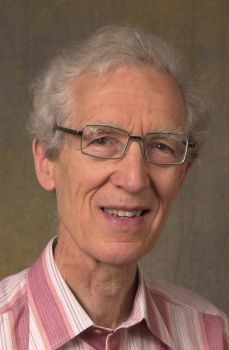Obituary: Michael Eraut (1940-2018)
Posted on behalf of: Education
Last updated: Friday, 21 September 2018

Michael Eraut, the well-known educator and longstanding Professor of Education at the University of Sussex, died peacefully, at the age of 77, on 7 September.
Michael studied as an undergraduate at Trinity Hall, Cambridge (1959-62) and stayed on to complete his PhD in Chemistry.
He then enjoyed two years as a Fulbright scholar at the University of Illinois, in the highly regarded Department of Instructional Development. On his return to England, Michael was invited by Professor Norman Mackenzie to come to Sussex to develop the newly created Centre for Educational Technology, at the leading edge of work on curriculum development and evaluation in the UK.
Michael went on to spend the rest of his academic career at Sussex, including an influential period as Director of the Institute for Continuing and Professional Education (1986-91). Under his leadership the Institute prospered. He led with commitment, insight and humanity during a turbulent period of change, overseeing the evolution of various graduate programmes, and even managing to generate a recurrent financial surplus, not least as a result of his success as a major grant-getting academic.
Michael became Professor Emeritus from 2006.
Michael’s early work in educational technology and curriculum development was widely admired and replicated. It produced protocols for the analysis of learning materials which were used by many institutions, and led to invitations to run national and international workshops. It also resulted in a ground-breaking Diploma in Educational Technology. Michael consolidated this work in a series of publications and editorial contributions to the International Encyclopaedia of Educational Research.
In the 1970s, with a growing demand for Continuing Professional Development (CPD) for mid-career professionals, Michael was quick to recognise the importance of linking curriculum development to the management of change. With other faculty, he developed the first Masters programmes that integrated organisational theory with the more conventional academic disciplines of psychology, sociology and philosophy.
Michael became best known for his contribution to professional development and work-based learning, a field he helped to shape and in which he became a world expert. His key insight was to unravel the many ways in which competence depends on learning in context through a combination of learning from books, people and experience. Michael’s research has profoundly influenced the education of many professions including teaching, engineering, business accountancy, and particularly medicine and nursing.
Michael held many substantial research grants, and his books include the highly acclaimed Developing Professional Knowledge and Competence, published in 1994, as well as many refereed journal articles. His last book, Learning Trajectories, Innovation and Identity for Professional Development, co-edited with Anne McKee and published in 2013, won an “Outstanding Publication Award” from the Education in the Professions division of the American Educational Research Association (AERA).
More than 50 students achieved PhDs under Michael’s supervision and many more students were offered a window into his world through his extensive and enthusiastic contributions to Masters programmes.
Michael was a mentor to many of the first generation of faculty at Sussex, and to those who came later. He gave his time generously and - with an economy of words, and often an excellent sense of timing - he would steer events and emotions towards rational compromise.
Michael was a scholar who understood that “people do not change their minds in meetings, but do so after reflection later”. His wisdom and insight will be missed by many at Sussex and in the academic and professional arenas he enriched with his ideas.
A service of thanksgiving at 11.30am on Thursday 11 October at St Anne’s Church, Lewes, will be followed by a private cremation for family only.
Emeritus Professor Keith M. Lewin
